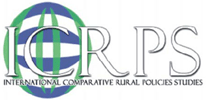The University of Missouri-Columbia has recently finished a survey report on the ICRPS Summer Institutes from 2004 to 2011, and the impact participation as a student or faculty has had on their careers. María Figueroa-Armijos, Summer Institute participant in 2008 and 2009, Thomas G. Johnson and Judith I. Stallmann present the results for Exploring Rurality readers.
by María Figueroa-Armijos, Thomas G. Johnson and Judith I. Stallmann, 24/04/2012
The results of the survey show that 83 percent of surveyed faculty members and 31 percent of surveyed alumni currently work in research and teaching in higher education institutions and research institutes and centers. Another four percent of the faculty and 13 percent of alumni are practitioners at local, national and international organizations. The scope of their research spans a wide variety of topics in rural, social, agricultural, environmental, and sustainability policy, as well as questions of governance, across countries and regions in North America, Europe, Africa, and Asia. Also, 91 percent of faculty members and 85 percent of alumni remain in touch with other ICRPS participants.
The results also indicate that the ICRPS summer institutes have had a positive impact on the career of a majority of faculty members, students, and mid-career professionals who have participated. About 74 percent of faculty members and 76 percent of alumni have recommended ICRPS to others, which confirm that those who have participated consider the ICRPS summer institute a valuable investment of time and effort. Furthermore, 65 percent of faculty members and 51 percent of alumni have worked or currently work on comparative policy research. Specific responses to the survey illustrate the wide variety of socio-economic, political, and environmental issues addressed by ICRPS participants around the world, and that the ICRPS experience and growing network has become a valuable tool for rural policy analysis, teaching, and practice.
The largest impacts of the summer institutes reported by faculty members are their exposure to the international network of scholars available through the Consortium, and the joint research projects that have emerged from collaborations within the network. The largest impact of the summer institutes reported by alumni is the unique information and learning, especially comparative and multidisciplinary research methods, acquired from the seminars, team projects, field trips, and informal discussions that take place during the intensive summer institutes.
The survey provides valuable feedback for the organization, curriculum, and pedagogy of future summer institutes. A key suggestion from faculty members and alumni relates to the inclusion of more sessions on quantitative and qualitative research methods for comparative research, and the need to increase the allotted time for participant interactions and discussions, so that more common research projects between and among participants can develop. A wide variety of topics were suggested for inclusion in future ICRPS programs; these suggestions will be considered by organizers of future summer institutes, although some of the suggestions have already been implemented in recent years.
Finally it should be noted that even after 10 years in existence, ICRPS is a nascent, evolving institution. Almost 1/3 of all student participants are still students. The institutional membership has grown and evolved over that last decade. Of the 12 active universities involved in the consortium seven have been involved for five or less years. Nonetheless, the continuing commitment of almost 80 percent of the faculty to the ICRPS summer institutes speaks to the sustainability of the ICRPS Consortium. The impact of the project is only beginning to be realized.
The report presents the results of a survey of faculty members and alumni of the eight International Comparative Rural Policy Studies (ICRPS) summer institutes hosted between 2004 and 2011 by partner institutions of the ICRPS Consortium. The goal of the survey was to improve our understanding of the impact of the past eight ICRPS summer institutes (2004-2011) on the careers of participants.
Download the report HERE
MARÍA FIGUEROA-ARMIJOS is an ICRPS alumna and holds a M.Sc. in Agricultural Economics from the University of Missouri-Columbia and a B.Sc. in Sustainable Agriculture and Natural Resource Management from EARTH University in Costa Rica. Maria is currently finishing a PhD in Public Affairs at the Truman School of Public Affairs. Her research interests include entrepreneurship, rural and regional economic development, policy analysis, and renewable energy policy.
THOMAS G. JOHNSON is a founding member of the ICRPS consortium. Dr. Johnson is Frank Miller Professor of Agricultural and Applied Economics, Professor in the Harry S Truman School of Public Affairs, and Director of Academic and Analytic Programs at the Rural Policy Research Institute (RUPRI). Professor Johnson co-secured the funding to send the 24 University of Missouri students to the previous summer institutes and has taught at all but one of the institutes.
JUDITH I. STALLMANN joined the ICRPS Consortium in 2006 and has served as a faculty member in the summer institutes since then. Dr. Stallmann is Professor of Agricultural and Applied Economics, Rural Sociology and the Truman School of Public Affairs. She has extensive experience in international issues and is fluent in Spanish. Her research areas include state and local public finance, rural economic development and fiscal and economic impact analysis. She co-secured funding for University of Missouri students to attend the summer institutes.
